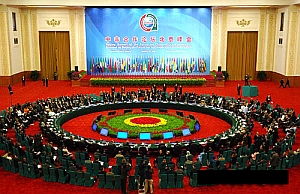China Good for Africa if...

China

A past China-Africa summit Photo courtesy
I visited Elang'ata-wuas a small trading center deep in the sinuses of Kajiado district in
Elang'ata-wuas popularly referred to as "Mile 46" is a sleepy trading center that wakes up only on Saturday- the market day. It brings together all sheds of Maasai communities from East Africa; one can mistake them for students in uniform - because all people turn up clad in the traditional Maasai red and blue shukas. "Can you imagine I had over 670 heads of cattle, but now I have less than 24." my good friend points out. Before I come up with my empathetic words, his colleagues interrupt, "Where is it raining now?" they ask. He looks up the horizon, pauses and then says "It is now raining heavily on the tarmac near Isinya." He looks up another direction. "It must be drizzling in Ngong!"
Curious, I seek to find out how he is able to triangulate to near accuracy where it is raining. I gather that herding cattle hundreds of miles across
As we continue to seep our warm drinks under a tree, rain drops pushed over by the wind from the hillside hit us. Whereas I expect everyone to dash for cover
The sharp rain detection skills exhibited by my friend and his ability to triangulate through the wilderness to get pasture for his cattle are amazing. What type of school system can turn such a person into an economically competitive member of society? Clearly, the Maasai and by extension other Kenyan/African communities do not necessarily require an education to turn them into civil servants and or employees of multinational corporations. We need an education that can respond to and leverage on our indigenous economies to make them globally competitive.
The challenges facing the Maasai are not only water and pasture, but how to integrate their system into the global one. For example, the Maasai traditionally save in cattle, the global system saves in banks and other financial institutions. The Maasai have a "photographic memory," the global system surrendered this chores to technology - one has to simply retrieve records. The Maasai has to rely on the rains - nature - to power his economy; the global economy is driven by human ingenuity. Suppose we designed a system that can make the Maasai learn in 30 minutes what it takes him/her to grasp after a 1,000km trek; what would be the outcome? Maasai ranches!?
Ancient sailors were freed from reliance on Monsoon winds by technology, to engine powered ships that sail all seasons all directions. We cannot realize the dream of African-mind powered economies if we simply replace rains for donors. Our African leaders look at the horizon and see "aid clouds" from
Yes,
By James Shikwati.
James Shikwati james@irenkenya.org is Director of Inter Region Economic Network
